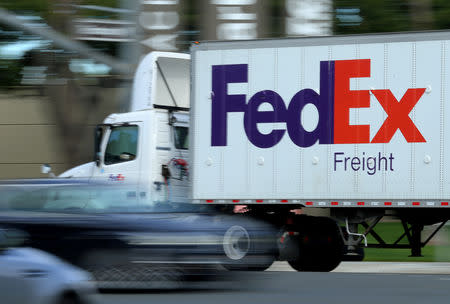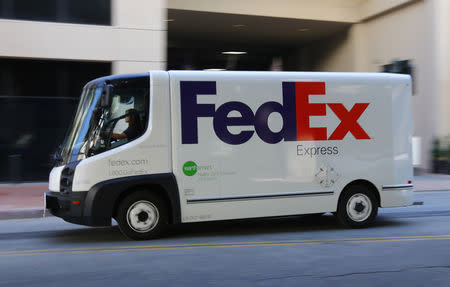FedEx sees global trade slowdown, says U.S. economy still 'solid'
By Lisa Baertlein
(Reuters) - FedEx Corp <FDX.N> on Tuesday slashed its 2019 forecast after Europe's economy weakened and the U.S. trade row exacerbated a slowdown in China, sending shares in the package delivery company tumbling more than 6 percent after the closing bell.
"Global trade has slowed in recent months and leading indicators point to ongoing deceleration," said FedEx Chief Financial Officer Alan Graf.
FedEx, which is in the throes of a record-setting winter holiday shipping season, launched a new cost-cutting campaign after its Express revenues took a hit. On Dec. 7, FedEx announced that the CEO of its Express unit was retiring at year-end.
Executives noted a sharp UK slowdown due to Brexit uncertainty, Germany's recent gross domestic product contraction, protests in France that threaten to spread to nearby countries and a cooling down in Asia.
FedEx is seen as a bellwether for the global economy and its results sparked concern that the United States may catch the "cold" affecting other regions, said Trip Miller, managing partner at Memphis-based Gullane Capital.
"This confirms a lot of market fears ... and is probably why the (stock) market has been off so much," said Miller.
Memphis, Tennessee-based FedEx cut its fiscal 2019 earnings forecast to $15.50 to $16.60 per share from $17.20 to $17.80 per share - before year-end mark-to-market retirement plan accounting adjustments and excluding TNT Express integration expenses.
FedEx Chief Executive Fred Smith said politics fueled much of the world's economic turmoil and that policy changes can turn it around.
The tempered outlook landed as FedEx grapples with ongoing margin pressure at its Express and Ground units and speculation that Amazon.com Inc <AMZN.O> will attack its own mounting transportation costs with a competing delivery network - a concept CEO Smith described as "fantastical."
Its new forecast assumes moderate U.S. domestic economic growth and no further weakening in international economic conditions, FedEx said.
The company moved quickly to reduce expenses and improve efficiency, even though executives said the U.S. economy "remained solid."
FedEx is offering voluntary buyouts to certain employees, reducing international capacity at FedEx Express, limiting hiring and cutting discretionary spending. It is also reevaluating its capital spending plans and share buybacks.
Profit jumped almost 21 percent to $935 million, or $3.51 per share, for the second quarter ended Nov. 30. Revenue rose to $17.8 billion from $16.3 billion.
FedEx shares dropped 6.2 percent to $173.51 in extended trading while rival United Parcel Service Inc <UPS.N> fell 3.5 percent to $93.85.
(Reporting by Lisa Baertlein in Los Angeles and Uday Sampath in Bengaluru; editing by Dan Grebler, Tom Brown and G Crosse)


